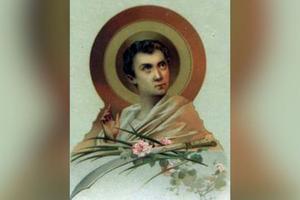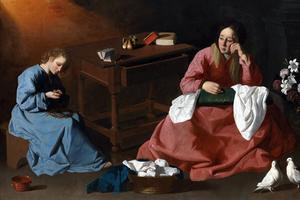5 Martyrs of Córdoba Beheaded for Defying Islam and Proclaiming Christ
These martyrs knew God to be the Holy Trinity, and Jesus Christ to be God.

The Alcazar of the Caliphs, a fortress and a palace, stood by the bank of the river Guadalquivir next to the Great Mosque containing a forest of arches. The two structures towered like goliaths over the Roman bridge spanning the river, as well as the narrow winding streets and surrounding buildings of Córdoba.
Both of these structures had been constructed under the orders of Abd al-Rahman I, the founding Emir of Al-Andalus, some seven decades prior. Each of his successors had added to them. They were symbols of Córdoba’s prosperity and ascent since the Umayyad Caliphate’s conquest of the Iberian Peninsula.
Al-Andalus, the lands of the Iberian Peninsula under Muslim rule, had broken away from the Caliphate shortly after the Abbasids overthrew the Umayyad dynasty, yonder in Damascus, back in 750. Emir Abd al-Rahman I, a surviving Umayyad, had escaped to Córdoba from Damascus and founded the state.
The Alcazar, now the home of Emir Abd al-Rahman II, the founder’s great-grandson, was the seat of power. Contained within its walls were a courthouse, government offices, baths and more. It was in the courthouse that the Five had been tried and condemned before their judge, who also was an imam. The judge had granted them four days to renounce their Christian faith and to accept Islam, or face execution.
The Five had declined to turn away from the Church. Those four days had passed.
The doors to the prison cells opened. The guards led them out, one by one. The Five felt the sun on their skin, and dry summer heat, for the first time in several days as the guards proceeded to escort them to the square where they were to be executed.
Aurelius, son of an Arab Muslim father and Spanish Christian mother, stepped out onto the street. He himself had been raised as a Christian, largely thanks to his maternal aunt. According to sharia, a child’s religion is that of his father, that he’d officially been born a Muslim, and so his Christian practice thus counted him as an apostate.
Natalia, his wife and the mother of their two children, followed. She too had been born into a Muslim family and had been given the name Sabigotho at birth. Her father died while she was young. Her mother later married another man, who was secretly a Christian, whose influence led to her own mother’s conversion as well as hers. Natalia was likewise counted to be an apostate.
Aurelius and Natalia had spent many years practicing their faith in secret. They’d conformed themselves to the imposed customs while in public. One day Aurelius had walked the streets, some years back, and witnessed the public ridicule of a fellow Christian man being whipped for having confessed his own faith. He’d resolved never to conceal his faith from then on. Natalia agreed to do likewise. They’d set aside enough money to provide for their children’s futures, given away much of the rest of their savings, and spent much time together visiting imprisoned Christians.
Felix, Aurelius’ cousin, followed them. He’d once converted to Islam, some years back, though his years as a Muslim were few. The examples set by Aurelius and Natalia had inspired him to return to the Church, to even accompany them during their prison visits, thus making his desertion of Islam a poorly-kept secret.
Liliosa, Felix’s wife, stepped out of the prison. She’d spent most of her life practicing her faith quietly. The fellowship of her husband, Aurelius, Natalia and the monk whom they’d befriended had helped her be bolder. She and Natalia had both been seen walking about in public with their faces unveiled, in defiance of the imposed customs, thus capturing the attention of authorities.
The last of the Five to emerge from his cell was George, the monk. He’d traveled as a beggar, having made his way from the Holy Land to Córdoba, to raise alms in support of his monastery. He was a known friend and accomplice to the defiant couples, having first been introduced to Natalia by an abbess.
George wasn’t an apostate, and was a foreigner, and so their judge had offered him leniency during the trial. “You may go back to your home,” the judge had told him, “but don’t ever come back to Córdoba, or anywhere in Al-Andalus for that matter.”
The prospect of walking away, while his friends would be honored with martyrs’ deaths, didn’t settle very well with George at all. He insulted Muhammad in front of the judge instead, there and then, thus earning himself the death sentence for blasphemy.
The prison guards continued to escort the Five along the paved roads toward the public square. Lines of onlookers stood watching, to their right, to their left. Some, whether Christian or Muslim, kept themselves silently sympathetic. Others, certain that the Five would soon be in hell, jeered. The rest, perhaps even the majority, were simply there for the show. It wasn’t every day that one got to witness five beheadings after all.
The Five were not the first of the Martyrs of Córdoba. Perfectus, a monk and priest, had been executed two years prior for having called Muhammad an adulterer. Other martyrs followed, most of whom were monks. Sisenandus was a deacon. Flora and Maria, two companion women, executed for apostasy and blasphemy respectively, were later said by some to have visited Natalia in a vision. Though Emir Abd ar-Rahman II himself would die later on that year, the executions would continue for several years more, under the rule of his successor Muhammad I. Eulogius, a priest who’d been keeping records of these executions, would be among the last to join the ranks of the Martyrs of Córdoba in the year 859.
This wave of recent martyrs baffled the authorities. The arrival of Muslim rule had come as a relief to many, more than a century ago. Many serfs were granted the status of freedmen upon their conversion to Islam. Jews were given status to Christians, though both were considered to be dhimmi, less than Muslims that is. The taxes were, all-in-all, lighter than they’d been under Visigoth rule. Several cities, Córdoba foremost among them, had flourished in commerce and learning. Roads were built. Running water had become far more common. The material gains were more than a few.
The Jews and Christians of Al-Andalus got by rather well and were free to practice their own religions, so long as they refrained from breaking the bounds of sharia law. A sudden and violent annihilation of Judaism and Christianity was deemed unnecessary by the conquerors more than a century earlier. The jizyah tax gave non-Muslims incentive to convert to Islam. The nominal in faith, of course, routinely favor paths of least resistance. Sharia allowed Muslim men to marry up to four wives, and also to marry Christian and Jewish women, since the religion of a child was legally recognized to be his father’s. Sharia allowed a Muslim woman, on the other hand, only to marry a Muslim man, lest her offspring would be non-Muslim. Sharia was designed to annihilate Christianity and Judaism gradually, and relatively peacefully. Such policies of taxation and breeding had worked very effectively, over the course of several generations, in other conquered lands.
But a century of rule, and prosperity to go along with it, had not been enough to subdue those whose conviction in Christ ran deep. This recent wave of rebellious Christians in Córdoba, who’d gone so far as to publicly insult the name of Muhammad, had caused some of the authorities to speculate whether these martyrs were actually suicidal. Measures had been taken to dispose of some of the martyrs’ remains, such as burning the corpses and scattering the ashes in the river, to prevent the distribution of relics. And yet the wave of men and women bold enough to defy sharia kept on coming.
The Five, who now were approaching the square, saw their executioners waiting and wielding the swords that would be the instruments of their death.
Aurelius met eyes with his wife, sweet Natalia, one last time until the hoods were thrown over their heads. Everything went dark. A thought of the Son of God, squirming on his cross, looking down upon him with welcoming eyes from up on Golgotha, crept into his mind amidst that sudden blindness. The heat of Brother Sun paled in comparison to the warmth he felt suddenly welling within himself.
He felt himself being pushed downward, his knees digging into the stone, the straining of his back and neck as he faced the ground beneath, mimicking prostration. He heard the sounds — whoosh whoosh — followed by thuds and knew by instinct that Natalia had been killed. He felt the soothingly cool shade cast by his own executioner who was standing and raising a sword above him.
Christ’s first cry on the cross occurred to him: “Father forgive them, for they know not what they do.”
Would his children be able to forgive this? he wondered to himself.
He didn’t hate his executioner, nor any of those men who’d brought him here, for they were simply men who’d done what they’d been taught as right. They were men who’d been told that God is Allah, transcendent, uncompromisingly one, whose majesty prevented him from doing anything so undignified as to dwell among us. They were men convinced that the conquests of Muhammad and his successors, impressive as they were, were irrefutable proof that Islam was indeed the one true faith. They’d done that which they’d understood to be right, just as he had done that which he knew to be right, that this was bound to happen.
Aurelius knew God to be the Holy Trinity, and that the love of God was such that the Son wasn’t ashamed to humbly dwell among us, to be like us in all ways but sin. And if God’s greatest act of love was to allow himself to die, that we may have the hope of everlasting life, then what greater honor could there be than to die alongside him?
It’s not in marching from victory to victory that we imitate Christ, or serve our neighbors, as it is in picking up our crosses to follow him.
He heard the whooshing as the sword descended upon him, and concealed in that very sound was the whisper of a Voice: “This day you will be with me in paradise.”
The Martyrs of Córdoba, 48 in all, were killed between the years 850 and 859. Saints Aurelius, Natalia, Felix, Liliosa and George were executed July 27, 852. The reconquest of Spain and Portugal took several centuries, ending in 1492, the very year in which Christopher Columbus made contact with the New World. Córdoba itself was taken back by Spain, led by King Ferdinand III of Castille, in 1236. The Great Mosque is now the cathedral.
Martyrs of Córdoba, pray for us!
- Keywords:
- martyrs
- islam
- martyrs of cordoba















